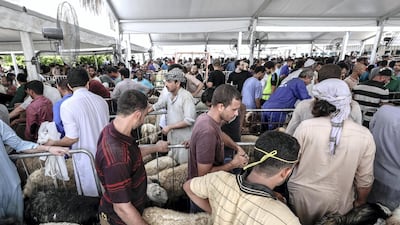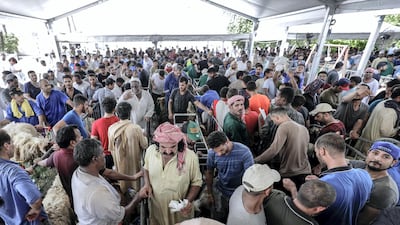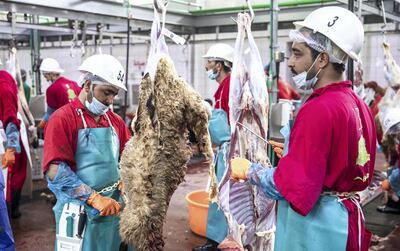Thousands of people braved the steaming August heat to visit Abu Dhabi's livestock market on Sunday.
From 5am on the first day of Eid Al Adha, pick-up trucks full of goats and sheep arrived from Liwa, Al Ain and elsewhere to Mina Zayed.
Temperatures close to 40°C and sticky humidity made no difference to the eagle-eyed customers who carefully assessed the animals in each stall.
Guarded questions about prices, impassioned bargaining and then talk of the best way to cook the animal soon filled the air.
“Sometimes we cook it on the barbecue,” said Syed Hamid, 31, clutching his newly bought goat. “But we also love mutton karahi – a classic Pakistani dish of meat and spices.”
Mr Hamid, from Lahore, was still bargaining with the seller but the price was heading north of Dh1,000.
Eid Al Adha is the festival of the sacrifice and it commemorates the Prophet Ibrahim’s willingness to sacrifice his son for God.
Having seen his devotion, God gave him a ram and instructed him to slaughter the animal instead of his son. It is one of the most revered religious holidays in the Muslim calendar.
It is traditional to buy an animal on this day and the meat is divided into three portions. The first is given to the needy, a second to friends, while the final part is kept for those who bought the animal.
The first day of Eid is the busiest and most expensive day of the year at the market. Lambs cost between Dh800 and Dh1,300 and goats from Dh800 to Dh1,900.
Some animals are from the UAE, such as the naeemi sheep, but others are flown in from places such as Romania and India.
The Mina Zayed market is well organised but it is still not for the faint-hearted.
Animals should be taken in steel carriers to the slaughterhouse but some workers drag them by their feet and they cry out in pain.
There are few such cases and municipality chiefs are making efforts to end the practice through education campaigns and stricter rules.

“That treatment is not nice,” said Salih Shaheen, 27, from Sudan, who was looking for a sheep. “Some of the helpers fight and the sheep suffer.”
Casting a watchful eye over the proceedings is Faraj Balouch, 35, who owns seven stalls at the market.
“These animals are not mistreated and have a good life,” he said, pointing to his clearly well-tended sheep.
“Some are carried in a bad way and this is not nice. But the municipality is improving the rules."
People once butchered animals at home but municipality chiefs have stopped this.
About 2,000 animals will be slaughtered on Sunday. It takes a mere 20 minutes to get the job done.
About 300 animals can be processed an hour by 150 butchers with eight vets watching on.
Head vet Dr Riaf Walid has been working at the facility for 25 years.
“When I started, many people even brought their own butcher,” said Dr Walid, 51. “There were few rules then. But Abu Dhabi Municipality changed all that.”
He said the municipality was constantly educating the workers but on the busiest day it was difficult to control everything.
“We don’t have 1,500 carriers,” the Syrian said. “But every year we have been making improvements.”
Almost 6,000 animals will pass through the Mina Zayed facility this Eid, and 20,000 across Abu Dhabi’s five official slaughterhouses, up from 19,000 last year.
A lesson in how to haggle, the livestock market is a glimpse at old Abu Dhabi. But not even this historic trade is immune from the web.
An online portal – zabehaty – now allows customers to buy an animal and have it butchered.
About 400 were ordered through the portal this year, up from 130 last year, and this could ease queues at the slaughterhouses.
But for now, Dr Walid will still have to put in an epic shift on Sunday, working from 5.50am to 10pm.
“At the end of my shift when everything is clean, I will be happy,” he said.












